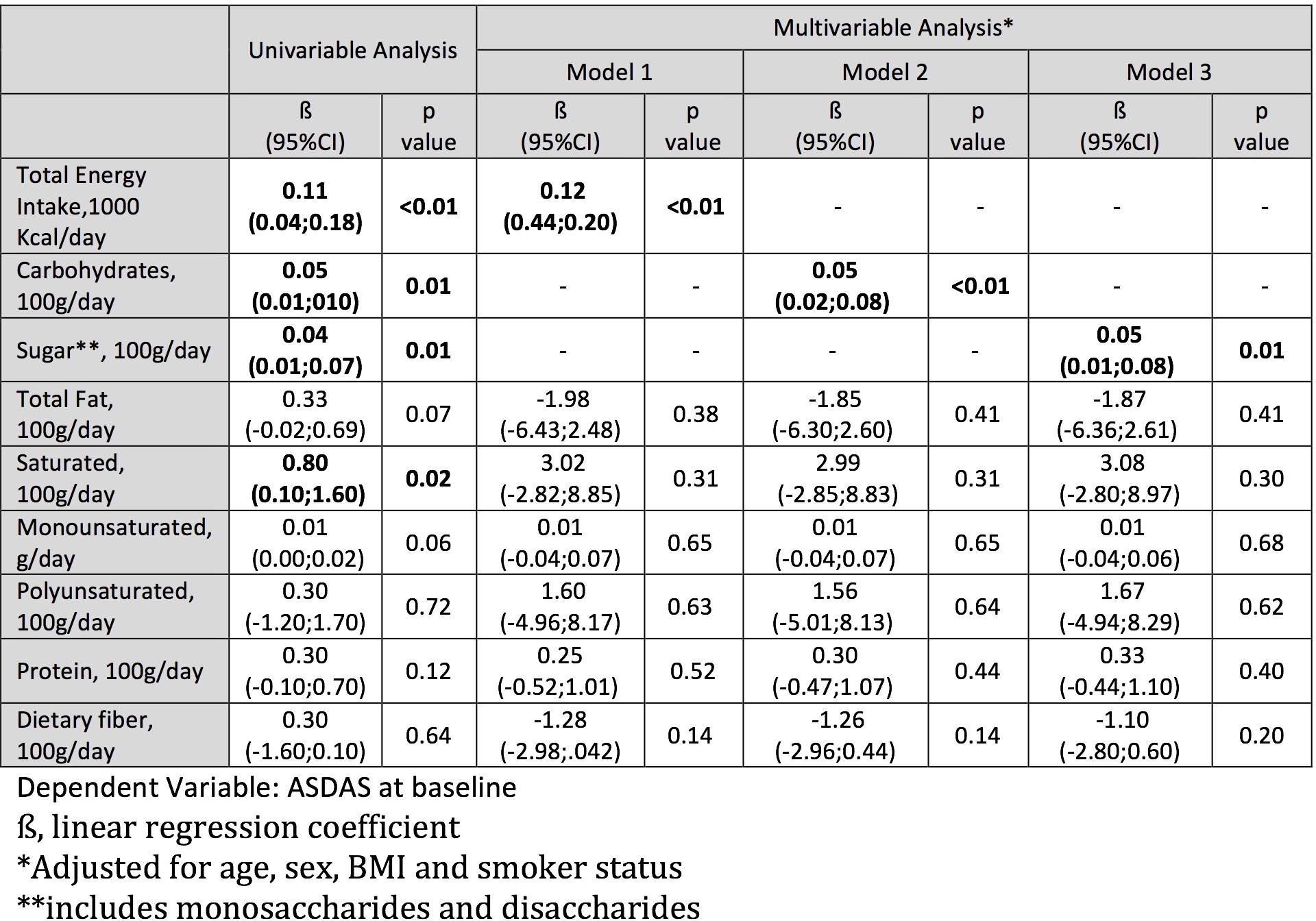Session Information
Date: Friday, November 6, 2020
Title: Spondyloarthritis Including Psoriatic Arthritis – Treatment Poster I
Session Type: Poster Session A
Session Time: 9:00AM-11:00AM
Background/Purpose: Diet has been described as a factor influencing the course of rheumatic diseases, such as rheumatoid arthritis and systemic lupus erythematosus (SLE). In addition, it has been previously reported that dietary sugar intake may contribute to subclinical inflammation and disease activity in SLE. However, no studies have been performed to investigate the possible association of nutritional parameters on disease activity in patients with spondyloarthritis (SpA).
Methods: Patients with radiographic axSpA (ankylosing spondylitis fulfilling the modified New York criteria) and starting a bDMARD therapy were recruited between 2015 and 2019 in an extension of the prospective German Spondyloarthritis Inception Cohort (GESPIC). Dietary habits were collected at baseline using the country-specific validated food frequency questionnaire (FFQ) developed for the use in the German Health examination Survey for Adults 2008-2011. The FFQ includes questions about the frequency and amount of 53 food items, consumed during the past 4 weeks, and enabled to compute individual mean consumptions of foods in grams per day. Total energy intake (in Kcal per day) and nutritional parameters: carbohydrates, free sugars, total fats, saturated fats, mono and poly-unsaturated fats, proteins and dietary fiber, were calculated for each patient using Prodi® software (version 6.10, Basis, Nutri-Science, Stuttgart/Germany) and the database of Federal Food Code (Bundeslebensmittelschlüssel), version 3.02. Disease activity measures (BASDAI, CRP and ASDAS), as well as height, weight and body mass index (BMI) were assessed at baseline before bDMARD treatment.
Results: A total of 129 patients with axSpA were included in this cohort. FFQ with the consequent nutritional analysis was performed in 104 patients. There were 68.3% males, and 86.5% were HLA-B27 positive. At baseline, patients presented BMI of 25.1±4.3 kg/m2, BASDAI 5.6±1.4, CRP 14.0±18.2 mg/l, and ASDAS 3.5±1.0.
In the univariable analysis, a higher energy intake and carbohydrates at baseline were associated with higher disease activity, measured by ASDAS, BASDAI and CRP (tables 1-3). This association was attributable to the full intake of carbohydrates and specifically to the total of free sugars (monosaccharides and disaccharides) and the decrease of dietary fiber as shown in the multivariable analyses (tables 1-3). This effect was independent of age, sex, smoker status and BMI.
Conclusion: A higher intake of carbohydrates and a higher consumption of free sugars are associated with higher disease activity in patients with AS.
 Table 1. Univariable and multivariable linear regression analysis of the association between ASDAS and nutritional parameters in patients with radiographic axial SpA (n=104)
Table 1. Univariable and multivariable linear regression analysis of the association between ASDAS and nutritional parameters in patients with radiographic axial SpA (n=104)
 Table 2. Univariable and multivariable linear regression analysis of the association between BASDAI and nutritional parameters in patients with radiographic axial SpA (n=104)
Table 2. Univariable and multivariable linear regression analysis of the association between BASDAI and nutritional parameters in patients with radiographic axial SpA (n=104)
 Table 3. Univariable and multivariable linear regression analysis of the association between CRP and nutritional parameters in patients with radiographic axial SpA (n=104)
Table 3. Univariable and multivariable linear regression analysis of the association between CRP and nutritional parameters in patients with radiographic axial SpA (n=104)
To cite this abstract in AMA style:
Rios Rodriguez V, D'Urso M, Höppner C, Proft F, Protopopov M, Rademacher J, Muche B, Lüders S, Haibel H, Verba M, Sieper J, Poddubnyy D. Higher Intake of Carbohydrates and Free Sugar Are Associated with Higher Disease Activity in Patients with Axial Spondyloarthritis [abstract]. Arthritis Rheumatol. 2020; 72 (suppl 10). https://acrabstracts.org/abstract/higher-intake-of-carbohydrates-and-free-sugar-are-associated-with-higher-disease-activity-in-patients-with-axial-spondyloarthritis/. Accessed .« Back to ACR Convergence 2020
ACR Meeting Abstracts - https://acrabstracts.org/abstract/higher-intake-of-carbohydrates-and-free-sugar-are-associated-with-higher-disease-activity-in-patients-with-axial-spondyloarthritis/
